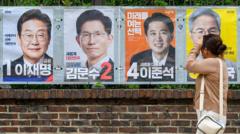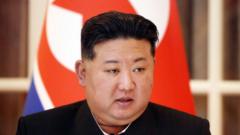The upcoming presidential election in South Korea is critical, with candidates navigating pressing social issues and the aftermath of former president Yoon Suk Yeol's controversial tenure.
South Korea Set for Presidential Election Amid Political Upheaval

South Korea Set for Presidential Election Amid Political Upheaval
As the nation braces for a new leader on June 3, the political landscape is marred by turmoil following the impeachment of Yoon Suk Yeol.
On June 3, South Korea will hold a presidential election, aiming to elect a successor to Yoon Suk Yeol, who faced impeachment after declaring martial law, which ignited significant political unrest. The controversial martial law declaration, made on December 3, cited threats from North Korea and domestic anti-state forces but was largely seen as a desperate move amidst his political troubles. This led to a quick impeachment by parliament, upheld by the constitutional court, culminating in a swift election mandated by law to take place within 60 days.
The rapid political changes have seen three acting presidents since Yoon's removal, with the immediate focus now on the election to stabilize a deeply divided society and economy. Key issues on the ballot include handling public discontent fueled by Yoon's actions, relations with North Korea, and the pressing matter of one of the world's lowest birth rates, which saw the national fertility rate plummet to 0.75 in 2024.
Polls indicate that Lee Jae-myung of the liberal Democratic Party is leading the race, promising a vision for a fairer society after narrowly losing to Yoon in 2022. Opposing him is Kim Moon-soo from the conservative People Power Party, who presents himself as the economic reform candidate. Other contenders include candidates from smaller parties and independents, but notably, there are no female candidates for the first time in 18 years despite historical precedents in electoral politics.
Election day will see polling stations open from 06:00 to 20:00 local time, with early voting already conducted for South Koreans abroad. With Yoon’s tumultuous administration still fresh in the public's memory, the election's outcome could shape the future political and economic landscape of this nation of 52 million facing substantial challenges, including international trade tensions and demographic shifts.
Yoon, now embroiled in legal troubles related to his presidency, faces charges that include insurrection and has been indicted for abuse of power. His party affiliations have shifted as he endeavors to influence the outcomes of the upcoming election in favor of his party's candidate. This election promises to be a significant turning point for South Korea, reflecting on past governance while aspiring for a renewed social contract.


















